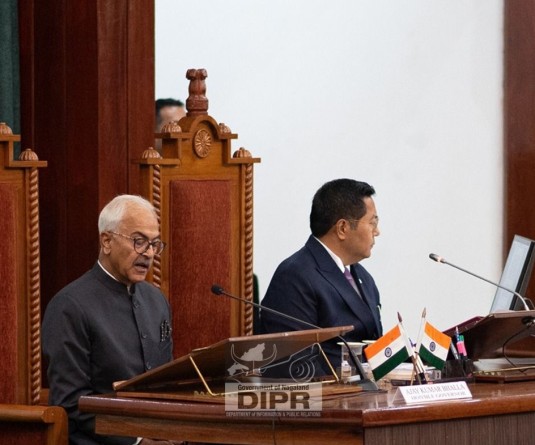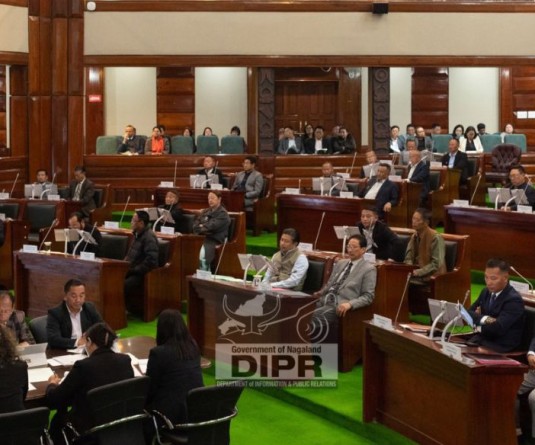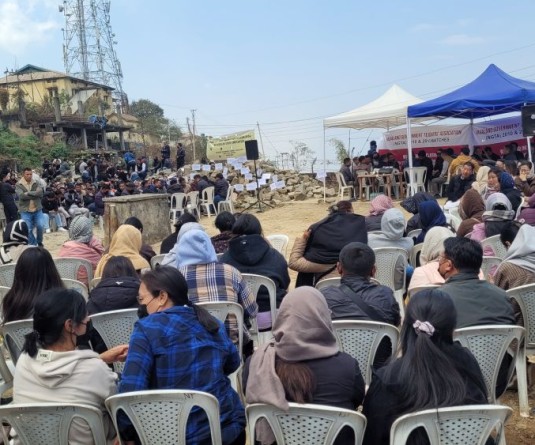A truck carrying essential commodities from Dimapur arriving at Mokokchung Municipal Vegetable Market on May 30, 2013. (Morung File Photo)

Longrangty Longchar
Mokokchung | June 16
It is a wonder that the markets of eastern and northern Nagaland, predominantly dependent on imports from Assam, could sustain for twenty days of road blockade from May 24 to June 13, 2013. The first blockade was imposed by the All Assam Tea Tribes Students Association that lasted till May 27, and a subsequent road blockade was imposed by the Ao Senden from May 28 till June 13. Many had thought that the blockade on the Mariani and Amguri roads which connect Assam with Mokokchung, Tuensang, Longleng and Zunheboto would choke the markets of essential commodities and that blockade would be opened within a week or so. But it went on for twenty long days; yet the markets sustained to some extent.
A post mortem analysis by The Morung Express clearly indicates that the road blockade was a success simply because of the huge support to the Ao Senden from every corner of society. It was not only the Ao community but other apex tribal Hohos also joined the Ao Senden to pressurize the government to meet the demands to which the Nagaland government finally relented. People’s emotions were at its heights and though the markets were obviously depleting of essential commodities, the general opinion among the people of Mokokchung was that the road blockade should not be lifted by the Ao Senden. Following a written assurance by the government, the Ao Senden ‘temporarily suspended’ its agitation.
“Even though the bandh is going on for such a long time, there are no complaints that have reached the Ao Senden thus far,” said the Ao Senden president, Dr. Sangyu Yaden while interacting with media persons on June 13 at his office. Even on the total Mokokchung bandh on June 11, people chose to remain indoors as a mark of solidarity to the Ao Senden.
But emotions do not fill the markets of essential commodities. So, how did the markets continue to provide essential commodities to consumers?
“We are prepared not to make Mokokchung citizens suffer due to the bandh, and we have made arrangements to transport essential commodities from Dimapur. We are even willing to work with neighbouring districts to supply essential commodities if they so desire,” said the president of Mokokchung Chamber of Commerce & Industries (MCCI), Moasangba Jamir during the start of the bandh. The silent but well-approved appreciation of the citizens towards MCCI has been well noted.
However, when it came to essential commodities like green vegetables, it was the local produce which supplied the people’s need since it is the ‘season’ of the year. Longkhum village supplied one metric tonne of tomatoes every day, informed the Longkhum Village Council chairman C Angang. The village could have supplied more had the tomato fields not been destroyed by incessant rains in early May, said the chairman while adding that the village produces 300-500 metric tonnes of tomatoes in a normal year.
“The Mokokchung market could have sustained for fifteen more days; however, we also took note of our immediate neighbours like Tuensang, Zunheboto and Longleng which struggled due to the bandh especially with regard to oil and LPG availability,” said Limalenden Longkumer, the Information & Publicity Secretary of MCCI.
Limalenden maintained that Mokokchung citizens did not suffer that much because of the relentless effort of the MCCI in supplying essential commodities and fixing of prices at reasonable rates by the Mokokchung Municipal Council too. He also maintained that the “volume” of the Mokokchung market is bigger than it was a few years back and therefore could store more goods in stock. Besides, the purchasing power of the people has also increased, thanks to the increasing number of local entrepreneurs which ensures that money circulation is greater than it was before. Had the markets been captured by illegal migrants like before Survival 2007 (the anti-migrant campaign initiated by AKM), then the money would have transferred out of Mokokchung without proper circulation in the local market, he added.
Nonetheless, the twenty days bandh took its toll on the economy. Successful local entrepreneur Tsukti Longkumer while saying that the bandh has had a positive social effect in bringing people together, the economic losses have been immense. Speaking from a commercial point of view, Tsukti asserted that eastern and northern part of Nagaland cannot depend or survive on Dimapur market. He therefore asserted that the government must find ways to revive the Tuli Train Station so that Mokokchung might become a commercial hub for the eastern and northern part of Nagaland. Unless, the Tuli Train station is revived, then this part of Nagaland has to depend on the Upper Assam markets for trade and commerce.
Anyhow, the citizens are heaving a sigh of relief as the trucks started rolling in with essential commodities and prices are being lowered again. However, with the Assam-Nagaland border dispute still unsolved and the flexing of economic muscles by Assam based organizations in the event of any border dispute remaining obvious. People still wonder how many times they will suffer the brunt of border tension.






